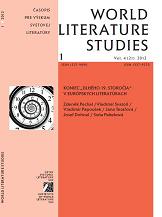Znovuzrození tragédie v ruském symbolismu
THE RE-BIRTH OF THE TRAGEDY IN RUSSIAN SYMBOLISM
Author(s): Vladimír SvatoňSubject(s): Literary Texts
Published by: SAV - Slovenská akadémia vied - Ústav svetovej literatúry
Keywords: Tragedy. The Conflict of „Strict“ and „Free“ Tragedy. Catharsis –Symbolism.
Summary/Abstract: The inspiration for this essay was the desire to understand the renewed interest in the genre of the ancient tragedy in Russian symbolism: several poets felt the currency of ancient drama not only as a source of theme, but also of literary (or stage) form. Interestingly, this influence is most evident in the work of the lyric poet Innokentii Annensky. The re-birth of the tragedy emerges from the place of this form in the European spiritul life: the core of the tragedy is the departure point of European ontology and ethics – the relationship of the unique entity (the individual) and the whole, in which the entity is submerged. The individual entity (the individual) is in European thinking not passively subjected to the super-personal whole, but proclaims its own initiative, while being at the same time involved in relationships whose nature it cannot know. The conflict arises from the fact that the whole, „the destiny“, is not an alien force, but integral part of the entity itself, which is thus unable to grasp it. The understanding of the super-personal force has undergone a development: while earlier it was understood metaphysically as an irreversible moral law, later it was seen as a „world order“ and in the epoch of sybolism as cosmic chaos that the individual must face, no matter what. The role of the chorus, scenes with satyrs and lyrical declamation suggested images of a world full of contradictions, ruled over by cosmic powers. It is significant that only one tragedy by Annensky, Thamyris Kitharódos, was stage produced – in Alexander Tairov Theater.
Journal: World Literature Studies
- Issue Year: IV/2012
- Issue No: 1
- Page Range: 25-42
- Page Count: 18
- Language: Czech

